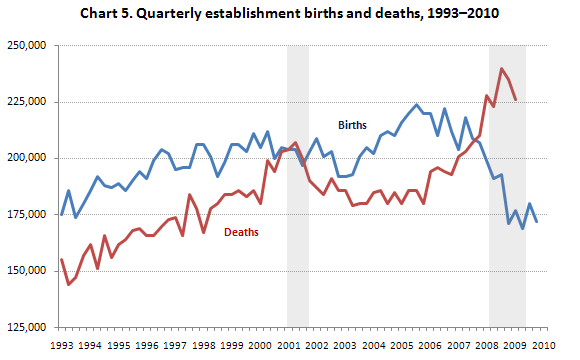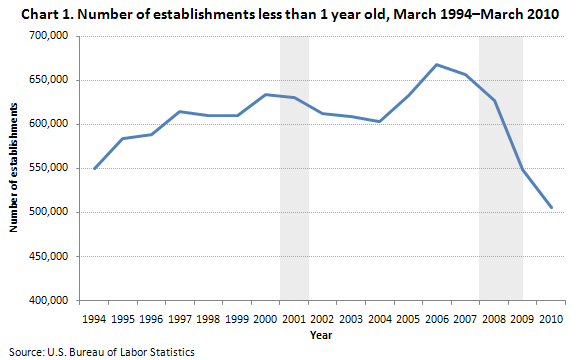
We seem to be in a golden age of startups. From my nearly quarter century view as a serial entrepreneur, it certainly seems that entrepreneurship does nothing but rise year after year.
Surprisingly, the U.S. Department of Labor says otherwise. According to the Bureau of Labor Statistics entrepreneurship has been declining.
According to the same research, the death rate of small businesses is exceeding the birth rate.
Three possible answers to the difference between how the startup market feels vs. what the data says:
1- The Department of Labor doesn’t make a distinction between scalable startups, the corner bakery, or a solopreneur web designer. To the DoL, a new business is a new business. Perhaps the recession quashed a lot of dreams of corner bakeries?
2- There are lot more dreamers than doers. Perhaps the seeming rise in startups is more wannapreneurs than entrepreneurs, dreaming of starting a startup, talking about their startup, but not launching their startup.
3- The ease of starting a startup has dropped to the point where fewer founders are “all in”. Perhaps more founders are doing their startups on evenings, weekends, and during breaks in their workday, not quitting their job, and thus not appearing as small business owners in the DoL statistics.
My gut says that the truth is a mix of all three of these reasons. However, the trigger for pulling up this research was an article from The Atlantic: The Rate of New Business Formation Has Fallen By Almost Half Since 1978. And that headline seemed too incredible to believe.
Further confirmation of this drop comes from The Kauffman Foundation and the Brookings Institute, as reported in The Washington Post: The Decline of American Entrepreneurship.
What do you think is happening here?

















I suspect the numbers are correct, the number of start up businesses of all kinds has dropped precipitously over time. My guess would be the reasons are complex, and include:
Student Loan Debt, now over $1 Trillion and climbing.
Big box store domination of the retail landscape, who would want to get in to opening a small store in midtown America anymore.
Too much uncertainty since the Great Recession started, people may be waiting for confidence and real opportunity to come back to the economy.
The growing wealth inequality across the west – funds aren’t available to take risks with.
The other aspect of this, from a purely start up eco-system perspective, is what I’d call the “Shark Tank Effect.”
Half of a generation has now been exposed to a show depicting raising funds being as easy as a 5 minute pitch – which we know is not the case! So I do think that in the high-tech or angel/VC funded start up world that there has probably been an increase in activity that flies in the face of the overall numbers that government and others track.
IN summary, the overall trend of small business creation is down, but the start up environment we inhabit is seeing growth, thanks to TV shows like Dragon’s Den and Shark Tank!
Cheers Rich
The mismatch between wealth and entrepreneurialism:
(from a comment on WP article above): “it is about lack of capital and risk taking. The problem is that those with the money, and there is plenty, don’t want to give it as freely as they once did to entrepreneurs. Especially if the entrepreneur is working on a non trendy idea — not an app, not software, etc. but perhaps something rather practical like factory waste reduction or women’s products or whatever, you name it — investors are not visionary as they once were. There has been a lot of talk about the risk taking nature of entrepreneurs but, lost is the problem of those with the capital unwilling to take risks and how this timidity is holding back the next big thing.”
Contributing to this is the wealth-age gap, which the recession and student loans have exacerbated (comparing 1984 to 2009):
“With high youth unemployment and mounting student debt, the typical U.S. household headed by a person 65 years of age or older is 47 times wealthier than that of a household headed by someone under 35, according to a new Pew Research study.
To be sure, assets do accumulate as one ages. But the gap between the two groups has doubled since 2005. Even adjusting for inflation, the disparity is nearly five times the 10-to-1 ratio recorded over 25 years ago.”
Read more: http://www.politico.com/news/stories/1111/67731.html#ixzz3anjKmIus
It’s not just wealth inequality, but the wealth transfer across generations. There would seem to be an increasingly inverse relationship between a person’s wealth and their willingness to take risks (based on age). How is a young person to get access to capital?
There is an incredible amount of wealth locked up in “safe” investments. How can we unlock more of that capital? Waiting for a generational transfer is not much of a strategy. I’m likely to inherit, but at 50, I’m also likely to be near or in my 70s before I see any windfall.
I wonder if the issue is in the data sources- the gab between now and 2015 reporting. The last five years have brought us an incredible resurgence in access to cash, emotional recovery from the Recession (the “holy shit what am I gonna do now” time lapse) and the availability of incubators and other macro and local tools to support entrepreneurs in major metro and even recovery markets (New Orleans, Detroit, etc.).